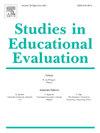反馈自我效能感在学生反馈参与中的作用
IF 2.6
2区 教育学
Q1 EDUCATION & EDUCATIONAL RESEARCH
引用次数: 0
摘要
教育反馈研究正从提供反馈转向接受反馈,但有针对性的干预仍需要更多基于理论的学生反馈参与研究。在高等教育中,促进反馈参与可以简化学习轨迹,减少失败率和辍学率。本研究的重点是一年级大学生(N = 392),他们根据不同的背景/(非)认知变量,以及补救和能力培训建议,对他们特定项目的有效学业成绩预测进行反馈。运用计划行为理论模型,分析了学生的意向反馈参与(IFE)和行为反馈参与(BFE),以及反馈自我效能感(FSE)和收到反馈。结果表明,生活对生活质量有正向影响,生活质量对生活质量有正向影响。反馈表明,更高的学习成功机会会增加FSE。生活充分中介了生活体验与生活体验之间的关系,生活体验在学生反馈与生活体验之间的关系。我们讨论了指导教育干预以增强FSE以促进学生反馈参与。本文章由计算机程序翻译,如有差异,请以英文原文为准。
The role of feedback self-efficacy in student feedback engagement
Educational feedback research is shifting from feedback provision to feedback reception, but more theory-based studies on student feedback engagement are still needed for targeted interventions. In higher education, promoting feedback engagement can streamline study trajectories and reduce fail and dropout rates. This study focused on first-year university students (N = 392) receiving feedback on their program-specific validated academic achievement prediction, based on various background/(non-)cognitive variables, along with remediation and competence training recommendations. Using a Theory of Planned Behavior model, we analyzed students' intentional (IFE) and behavioral (BFE) feedback engagement, as well as their feedback self-efficacy (FSE) and received feedback. Results show IFE positively influences BFE, while FSE positively affects IFE. Feedback indicating a higher chance of study success increases FSE. IFE fully mediates the relationship between FSE and BFE, and FSE between students’ received feedback and IFE. We discuss directing educational interventions towards enhancing FSE to promote student feedback engagement.
求助全文
通过发布文献求助,成功后即可免费获取论文全文。
去求助
来源期刊

Studies in Educational Evaluation
Multiple-
CiteScore
6.90
自引率
6.50%
发文量
90
审稿时长
62 days
期刊介绍:
Studies in Educational Evaluation publishes original reports of evaluation studies. Four types of articles are published by the journal: (a) Empirical evaluation studies representing evaluation practice in educational systems around the world; (b) Theoretical reflections and empirical studies related to issues involved in the evaluation of educational programs, educational institutions, educational personnel and student assessment; (c) Articles summarizing the state-of-the-art concerning specific topics in evaluation in general or in a particular country or group of countries; (d) Book reviews and brief abstracts of evaluation studies.
 求助内容:
求助内容: 应助结果提醒方式:
应助结果提醒方式:


